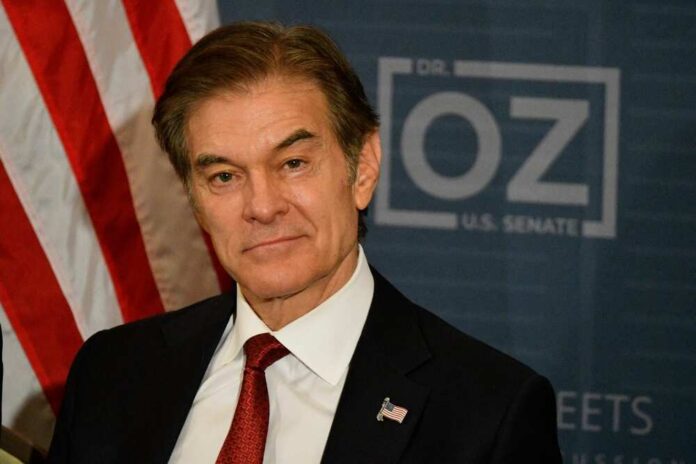
Dr. Oz finally takes control of Medicare and Medicaid with a Senate vote of 53-45, setting the stage for what could be the biggest overhaul of these bloated systems in decades.
In a pivotal moment for American healthcare, Dr. Mehmet Oz has been confirmed to lead Medicare and Medicaid following a Senate vote that largely followed party lines. As a renowned cardiothoracic surgeon and television personality, Dr. Oz brings a unique combination of medical expertise and public communication skills to programs that insure nearly half of all Americans. His confirmation comes at a critical time when the Trump administration is considering significant reforms to address unsustainable spending. With Health Secretary Robert F. Kennedy Jr. already implementing substantial cuts at HHS, Dr. Oz’s leadership signals a potential transformation in how government healthcare is delivered and funded.
Senate Confirms Dr. Oz Along Party Lines
The Senate’s 53-45 vote confirming Dr. Mehmet Oz to lead the Centers for Medicare and Medicaid Services (CMS) demonstrates the partisan divide over healthcare policy in America. This narrow margin of victory highlights the contentious nature of his appointment, with Republicans rallying behind Dr. Oz’s promises of reform while Democrats expressed grave concerns about potential coverage reductions. At 64, the former television personality and accomplished surgeon will now oversee programs that provide health insurance to approximately 150 million Americans—a responsibility that carries enormous implications for the nation’s healthcare landscape and economy.
Dr. Oz’s confirmation is particularly significant given the current political climate. The Trump administration, along with GOP lawmakers, has proposed substantial Medicaid spending reductions to help fund the President’s tax-cut package. This approach aligns with conservative principles of fiscal responsibility but has sparked fierce debate over the potential impact on vulnerable populations who rely on these services. During his confirmation hearings, Dr. Oz acknowledged these concerns while emphasizing the need for program sustainability—a delicate balancing act that will define his tenure.
Medicare Advantage Reform on the Horizon
One of the most intriguing aspects of Dr. Oz’s anticipated leadership is his stance on Medicare Advantage programs. Despite being a proponent of these private insurance alternatives to traditional Medicare, he surprised many by acknowledging serious problems with the system during his Senate Finance Committee confirmation hearing. Specifically, he recognized concerns about insurers overbilling the government—a practice that has cost taxpayers billions of dollars annually. This recognition suggests Dr. Oz may pursue reforms that maintain the popular program while addressing its financial abuses.
For conservatives who have long criticized government waste, Dr. Oz’s commitment to address Medicare Advantage overbilling represents a potentially significant win. By targeting this specific issue, he could recover substantial funds without reducing necessary services. This approach aligns with fiscal conservatism while avoiding politically damaging accusations of abandoning seniors. If successful, such reforms could serve as a model for other efficiency-focused changes throughout CMS, demonstrating that improved oversight can achieve cost savings without sacrificing quality of care.
Medicaid Reform and the Progressive Meltdown
As expected, progressive Democrats are already sounding apocalyptic alarms about potential Medicaid reforms under Dr. Oz’s leadership. Their warnings about coverage losses reveal their fundamental belief that government programs can only be measured by dollars spent, not outcomes achieved. What they fail to acknowledge is that Medicaid’s current trajectory is unsustainable, with spending that continues to consume ever-larger portions of both federal and state budgets. Responsible reform isn’t about abandoning those in need—it’s about ensuring these critical safety nets remain viable for future generations.
The hysteria from the left ignores the reality that Medicaid desperately needs innovation. Under decades of progressive management, the program has become bloated with administrative costs while often delivering substandard care. By applying his medical expertise and fresh perspective, Dr. Oz has the opportunity to implement reforms that could actually improve health outcomes while controlling costs. This might include expanding telehealth options, reducing bureaucratic hurdles for providers, and implementing incentives for preventive care—changes that could benefit recipients while respecting taxpayers.
A New Era for American Healthcare
Dr. Oz’s confirmation, combined with Robert F. Kennedy Jr.’s leadership at Health and Human Services, signals the most significant shake-up in American healthcare administration in decades. Both men bring outsider perspectives and have demonstrated willingness to challenge entrenched interests. Kennedy has already implemented deep cuts to the HHS bureaucracy, including significant layoffs and buyouts, creating an environment where meaningful reform is possible. This tag-team approach could finally address the inefficiencies and unsustainable spending that have plagued American healthcare for generations.
For conservative Americans frustrated with endless government expansion and wasteful spending, this moment represents a rare opportunity. After years of watching healthcare costs spiral while quality stagnates, we finally have leadership willing to make difficult decisions. Dr. Oz’s medical background gives him credibility to implement changes that bureaucrats could never accomplish. While progressives will inevitably fight to preserve the bloated status quo, Americans who value fiscal responsibility and effective governance should welcome this appointment as a long-overdue chance to bring common sense to Medicare and Medicaid.




















